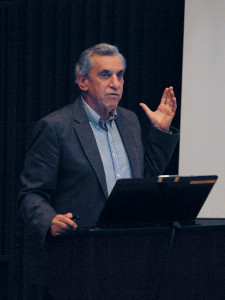“Visions of Tomorrow” was the theme at Wednesday evening’s Stanford 2020 Symposium, which included seven 15-minute presentations by notable Stanford faculty on a host of subjects ranging from global democracy to a food revolution.
The event, financially supported by the ASSU, the Speaker’s Bureau and the Vice Provost for Undergraduate Education, and co-sponsored by 18 other campus groups, united seven faculty members of diverse specialties to discuss fundamental future trends and problems gleaned from their own research, and the multidisciplinary approaches to their solutions.
The event was kicked off by David Kennedy, professor of history, who spoke about the potential for a water shortage in the American West in the near future, which he attributed to climate change, land subsidence and a flawed plumbing infrastructure.

“The tremendous success story that is the development of the American West was made possible by massive irrigation,” Kennedy said.
He warned that ongoing trends mean the future supply of water for humans is far less certain than a generation ago. Kennedy concluded by discussing the global scope of the problem and sharing his hope for the audience to work toward a solution.
Larry Diamond ‘73 M.A. ‘78 Ph.D. ‘80, director of the Center on Democracy, Development, and the Rule of Law (CDDRL), presented on the topic of a more democratic world, and shared his optimism for this trend to become the norm.
This hope was compounded by his observation that “there exist many now functioning democracies despite relatively modest economic growth,” in contrast with the prevailing narrative that freedoms are closely connected to economic performance.
“You don’t have to be a part of the middle class,” he asserted, “to believe in dignity, or in human rights.”
The “clock is ticking for authoritarian regimes,” Diamond concluded, asserting that 2020 will be a much freer and more democratic time than today.
Stan Christensen, a lecturer in civil and environmental engineering and a partner at Arbor Advisors, proceeded with the topic of negotiations, their importance, their under-appreciation and common misconceptions on the subject.
“Most of the people in this room will be doing jobs in 10 years that do not exist today,” he argued, asserting that negotiation will be critical to success in new areas. “Managing debates is negotiation, and the process can be more important than the potential solutions put forward.”
Christensen asserted that a successful negotiation entails “a framework to negotiate, preparation, a problem-solving rubric based on fairness and a focus on the long term.”
Professor Emeritus of Religious Studies and Philosophy Thomas Sheehan delivered his talk on “modern scholarship of Jesus of Nazareth,” as a “figure in history as contrasted with a figure of faith.” Sheehan said that Jesus’ progression from prophet to divine figure took over seven decades, creating a “paradigm shift in the study of Christianity.”
Christopher Gardner, director of nutrition studies at the Prevention Research Center discussed a “food revolution” as the solution to the enormous problem of “feeding everyone on the planet,” emphasizing “Stanford’s unique position to attack the problem.”
Gardner described his involvement in Stanford’s first Food Summit in 2010, where he drew expertise from each of the University’s seven schools to arrive at the concept of a “systems approach to food,” wherein large, individual actors can be made more aware of their food decisions.
Next came Ravi Vakil, professor of mathematics, who spoke of Stanford’s pedagogic philosophy as a quality research and teaching institution, and the implication of this “big bet” for the challenges we will face in the future.
“The number of different exceptional faculties we have here is not accidental. It is intentional to our mission to provide an education which is both broad and deep,” Vakil said, arguing that those characteristics “are not in tension.”
The University “is for those students who create for themselves, and not who want to be given,” he added.
“When confronted with the choice of broad versus deep, research versus teaching, pure versus applied, or basic research versus solving large problems, we should immediately, instinctively, and aggressively reply, ‘all of the above,’ no matter how challenging,” Vakil said.
Paul Wise, professor in child health, concluded the symposium with a discussion of the “unnecessary dilemmas individuals face when they see the collision of their technical learning against the reality of the undeveloped world.”
“This acute existential disorientation, as I call it, is unfounded…and I hope that I am looking at individuals who take this dual struggle for efficacy and justice as always inextricably linked,” Wise said.